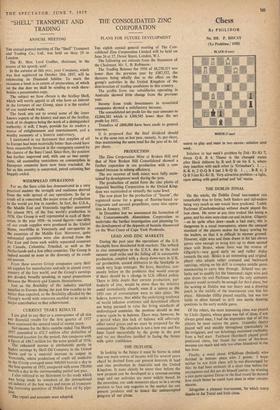Chess
By PHILIDOR No. 105. P. BISCAY (`La Probleme,' 1955)
BLACK (6 men) WEifTE (7 men)
wnrrE to play and mate in two moves: solution next week.
Solution to last week's problem by Zuk: Kt-Kt 7, threat Q-K B 4. Theme is the changed mates after Black defences by R and B on his K 6, where
they interfere with each other (a 'Grimshaw'). 1 . R-K 6; 2 Q-Q B 4 (set 2 R-Q 4). I . . . B-K 6; 2 Q-B 3 (set Kt-Kt 3). Very attractive problem—a light, open setting with good actual and 'set' mates.
THE DUBLIN ZONAL
On the whole, the Dublin Zonal tournament ran remarkably true to form, both leaders and tail-enders being very much as one would have predicted. Ludek Pachman (Czechoslovakia) without doubt played the best chess. He never at any time looked like losing a game, and his wins were clear-cut and incisive. Gligoric —as he quite often does—made a had start; this is dangerous in a zonal tournament, where the unequal standard of the players makes for heavy scoring by the leaders, so that it is difficult to recover ground. However, eight wins and three draws in his last eleven games were enough to bring him up to share second place with Benko, whose form was the reverse of Gligoric's—very &god early on and rather shaky towards the end. Benko is an interesting and original player who adopts rather cramped and backward openings, relying on his skill in complex middle game manoeuvring to carry him through. Schmid was un- lucky not to qualify for the Interzonal; eight wins and nine draws (he and Pachman were the only unbeaten players) would normally be enough for third place, but the scoring at Dublin was too heavy and a drawing patch in the middle of the tournament cost him his place. Alexander (fifth) played steadily, but was too liable to allow himself to drift into sterile drawing positions in the early middle game.
Of the others, the most interesting chess was played by Llado (Spain), whose game was full of ideas, if not always good ones; 1 had the impression that of all the players he most enjoys the game. Guistolisi (Italy) played well and steadily throughout (particularly in the endgame), and van Scheltinga recovered creditably from a bad start. Fairhurst (Scotland) played good positional chess, but found the strain of five-hour sessions too much and only too often blundered in the last hour.
Finally, a word about O'Sullivan (Ireland), who finished in bottom place with 2 points. I hope neither he nor Irish chess will be too discouraged by this: he had been seriously ill a short time before the tournament and did not do himself justice—by winning a nice game against Durao in the final round he showed how much better he could have done in other circum- stances.
Altogether a pleasant tournament, for which many thanks to An Tostal and Irish chess.


































 Previous page
Previous page